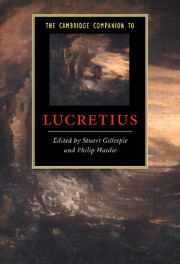Book contents
- Frontmatter
- Introduction
- Part I: Antiquity
- Part II: Themes
- Part III: Reception
- 12 Lucretius in the Middle Ages and early Renaissance: transmission and scholarship
- 13 Lucretius in the Italian Renaissance
- 14 Lucretius in early modern France
- 15 Lucretius in the English Renaissance
- 16 The English voices of Lucretius from Lucy Hutchinson to John Mason Good
- 17 Lucretius in the European Enlightenment
- 18 Lucretius in Romantic and Victorian Britain
- 19 Lucretius and the moderns
- Dateline
- List of works cited
- Index of Main Lucretian Passages Discussed
- General Index
18 - Lucretius in Romantic and Victorian Britain
from Part III: - Reception
Published online by Cambridge University Press: 28 May 2010
- Frontmatter
- Introduction
- Part I: Antiquity
- Part II: Themes
- Part III: Reception
- 12 Lucretius in the Middle Ages and early Renaissance: transmission and scholarship
- 13 Lucretius in the Italian Renaissance
- 14 Lucretius in early modern France
- 15 Lucretius in the English Renaissance
- 16 The English voices of Lucretius from Lucy Hutchinson to John Mason Good
- 17 Lucretius in the European Enlightenment
- 18 Lucretius in Romantic and Victorian Britain
- 19 Lucretius and the moderns
- Dateline
- List of works cited
- Index of Main Lucretian Passages Discussed
- General Index
Summary
The first great Lucretian moment in Britain was the end of the seventeenth century, with Thomas Creech’s 1682 translation as its centrepiece. Perhaps because the impact of this moment was so thoroughly absorbed, no new translation appeared until near the end of the eighteenth century; but at its close four appeared within fourteen years of each other: by John Nott (Book 1 only, 1799), John Mason Good (1805), William Hamilton Drummond (Book 1 only, 1808) and Thomas Busby (1813). These were part of what deserves to be called the second British Lucretian moment, from about 1790 to 1820. The exceptionally turbulent period normally tagged with the simplifying label ‘Romantic’ was marked not only by its partial attempts to transcend the aims of Enlightenment rationalism, but also by many efforts to bring those aims about. In this spirit, ‘all that Epicurus and Lucretius have so greatly and convincingly said’ was invoked in justification of the first manifesto for atheistic materialism openly published in Britain, Matthew Turner’s Answer to Dr Priestley’s Letters to a Philosophical Unbeliever of 1782. Though not all Romantic Lucretians were such complete unbelievers as Turner, the DRN’s role as a scourge of religious orthodoxy was well understood on both sides of an increasingly acerbic debate.
This religious debate cannot be separated from a political context in which Enlightenment ideas were increasingly associated with the French Revolution, whose broad welcome in 1789 was soon followed by horrified revulsion and the declaration in 1793 of an Anglo-French war which continued almost uninterrupted for twenty-two years. For supporters of the increasingly embattled British Enlightenment, this was partly a civil war in which the embrace of progressive rationalism at home was coming under ever more furious attack as godless, pro-French and unpatriotic.
- Type
- Chapter
- Information
- The Cambridge Companion to Lucretius , pp. 289 - 305Publisher: Cambridge University PressPrint publication year: 2007
- 7
- Cited by

